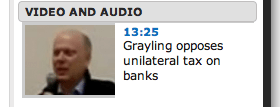We have just witnessed a fascinating glimpse of the use of the internet in elections. This morning, Cameron proposed a unilateral bank tax – moving, I suspect, ahead of what he believes Darling will announce in next week’s budget. Next, at 1.19pm, Will Straw digs up a selectively-edited version of Chris Grayling speaking in his local constituency (put online by the Labour candidate, Craig Montgomery). Straw’s headline: “Calamity Grayling opposes Cameron’s unilateral bank tax.”
Now, this headline – a lie – might have worked on a Labour Party press release. But it’s far harder to lie on a blog. Grayling is quoted saying “there is absolutely no point on earth is any one country doing this unilaterally, because otherwise all the banking transactions will simply move to another one”. Gotcha? Hardly. As Straw, at least, has the decency to admit Grayling was talking about Brown’s financial transactions tax, Cameron is talking about compulsory insurance for the banks (a tax which The Spectator supports). Crucially, Straw allows comments on his site. Instantly, the commentators exposed his trick. At 1.34pm – 15 minutes after the post, “Joanna” said this “Um, but he is talking about a transactions tax (as proposed by Gordon Brown), which the tories have ruled out. what they are proposing is a tax on banks’ balance sheets. So nice try, but another miss I’m afraid”. She blogged again, saying “ps I’m sure you know the difference between a transactions tax and a tax on banks balance sheets, so can only conclude this is a deliberate act of mischief.” Straw’s little stitch-up was exposed – and on his own blog. Anyone reading it would see, in the comments, his attempted deception.
But at 1.05pm the Labour Party admired his efforts, and tried the press release trick – without mentioning that Grayling was referring to a forex transactions tax. Paul Myners, the Treasury minister, is made to say ““Even his own Shadow Home Secretary Chris Grayling has condemned this badly thought out idea, saying: “there is absolutely no point on earth is any one country doing this unilaterally, because otherwise all the banking transactions will simply move to another one.” Labour can’t now link to Will Straw’s blog, due to the comments exposing his ruse. So they have instead linked to the YouTube page. Their aim will be to try and deceive journalists who may not have seen Straw’s post, and who would not contact the Tories for comment. But most political journalists will have seen Straw’s post on PoliticsHome and will – thanks to Joanna – be forewarned. As a result, I doubt any journalist will be so stupid as to swallow the bait tomorrow.
PS I’m generally quite impressed by Will Straw’s blogging. I know it’s election time, but it’s unbecoming of him to deceive his blog readers in this way. As he’ll find, the hyperscrutiny of the blogosphere makes it very difficult to do so.
UPDATE: I may be eating my words already. Straw’s sleight of hand does seem to have confused politicshome team, who have the below heading on their link to the YouTube clip. This was at 1.25pm, before the commentators had a chance to correct it.

Update 2: Straw says (below, and in an update on his blog) that the principle holds good: if you oppose a unilateral forex tax, you must therefore oppose all unilateral bank taxes. So Grayling was declaring himself opposed to the principle. As if. The practicalities of, say, a forex tax and general corporation tax levies are materially different – as Straw will know from his time in the Treasury. He evidently spent too much time there, because he is serving up a Brownie. His post is written not from confusion, but from a careful deliberate attempt to conflate and mislead.
Straw’s headline is specific, saying Graying opposes “Cameron’s unilateral bank tax” – ie, the version that Cameron is proposing. Straw simply over-reached himself here, and should replace that headline because it is a lie. The Labour Party may be happy to spin that lie, but Straw is now a blogger, no longer a partisan hack. As a blogger, he has his own integrity to maintain (in a way that a political attack machine does not).







Comments